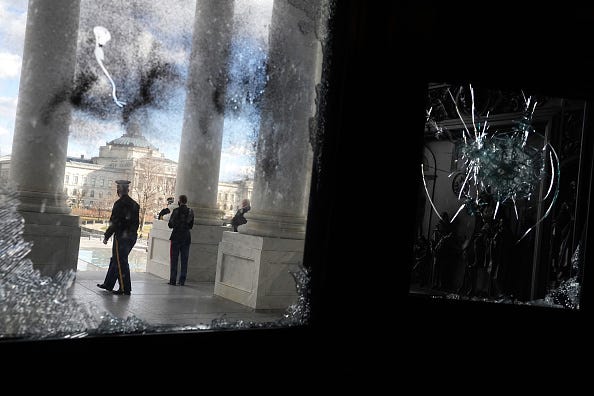The Problem We Are Living With
November 2, 2021

Dear Readers,
Today in Dallas, hundreds of people lined the section of Elm Street where Lee Harvey Oswald fatally shot President John F. Kennedy fifty-eight years ago. Some traveled great distances to be there. They were described variously as QAnon supporters or conspiracy theorists, but for reasons I’ll get into, it seems more on point to say that they were a special strain of Trump supporters—the kind who dream of a magical series of events that will restore former President Trump to power and sweep away the opposition to him. For the congegrants in Dealey Plaza, the magical thinking held that JFK’s son, who died in a plane crash off Martha’s Vineyard in 1999, would appear at the site of his father’s assassination and there ally himself with Trump.
This fringe crowd and a frighteningly large faction of Americans share a key obsession—putting or keeping Trump in power by any means, even unreal ones.
In addition to the son, many in the crowd thought JFK himself, recovered from his wounds and 104 years old, would choose to end nearly sixty years in hiding by coming to speak to them in that most painful of places. President Kennedy, the fantasy ran, could use some vague residual powers he still holds to anoint Trump president immediately and replaced the much despised Mike Pence as VP with his own resurrected son.
Some in the crowd manifested the presence of other dead, beloved figures.
Let’s speak plainly. Those people who showed up in Dealey Plaza expecting to see the Kennedys are lunatics. President Kennedy and his son, along with Robin Williams and Dale Earnhardt, are long dead. They cannot act in this world anymore, no matter how much we wish they would. We are left to cope with the future without them.
However, these particular lunatics are an interesting case study in a larger phenomenon. They’ve been called QAnon supporters by The Dallas Morning News, Forbes, and the NBC Affiliate in Dallas. However, in showing up for this gathering, they’re heretics. The fount of the QAnon movement—supposedly a highly placed government official who goes by the moniker “Q” after his security clearance level in Delphic online message board posts—exploded their JFK Jr. theory in no uncertain terms three years ago.
Is it “weird” that Q’s word, which is so potent in other contexts that it has led to outbursts of violence, standoffs on the Hoover Dam, and purportedly the death of one mafia kingpin, would mean nothing in this specific instance?
I’d argue that it’s not weird. As much as QAnon operates like a traditional sect under the sway of its nominal leader, the glue that holds the movement together is not the charisma of that leader, who is after all a nameless, faceless, poster on online forums. Instead, it’s the promise of “the Storm”—a fantasy scenario that Q first unfolded in 2017 and endlessly revised, which posited that some lawful power was imminently going to be rounding up, killing, and generally annihilating the perceived opposition to then-President Trump, i.e. the so-called Deep State, the Clintons, the Democrats, etc. Q accused those opponents of pedophilia and other heinous crimes (with no evidence whatsoever) to supply the superficial justification for the violent fantasizing, but the core of the appeal is the traditional dream of authoritarianism—creating the conditions for an adored political leader to rule without lawful opposition or legal limitations—and I suspect that’s the essence of its power. The Kennedy Family fantasy scenario offers a different path to the same dream—a resurrected martyr putting the crown on Trump’s brow—and that’s why it has earned adherents notwithstanding Q’s rejection.
Those authoritarian notions appear to have alarmingly broad appeal. A poll by the Public Religion Research Institute and the Interfaith Youth Core in May 2021 found that 20% of Americans believe that “there is a storm coming soon that will sweep away the elites in power and restore the rightful leaders.” The same poll found that 15% of Americans agreed that “American patriots may have to resort to violence in order to save our country.” Among Republicans, 28% agreed with both statements.
We saw the expression of that authoritarian yearning and the surreal determination to make it reality not only in strange fringe events in Dallas, but also inside the Capitol on January 6th. Douglas Jensen, the Iowa man who chased Capitol Police Officer Eugene Goodman up the steps by the Senate chamber, didn’t just wear a QAnon shirt that said “Trust the Plan,” he instructed the police officers he encountered next to “go arrest the Vice President.”
For six years, we have been witnessing the rise of an authoritarian social movement in America that’s complementary to the authoritarian personal aspirations of former President Trump. It often wanders, as it did in Dallas, into absurd surreality, but the problem it poses for the country is deadly serious.






